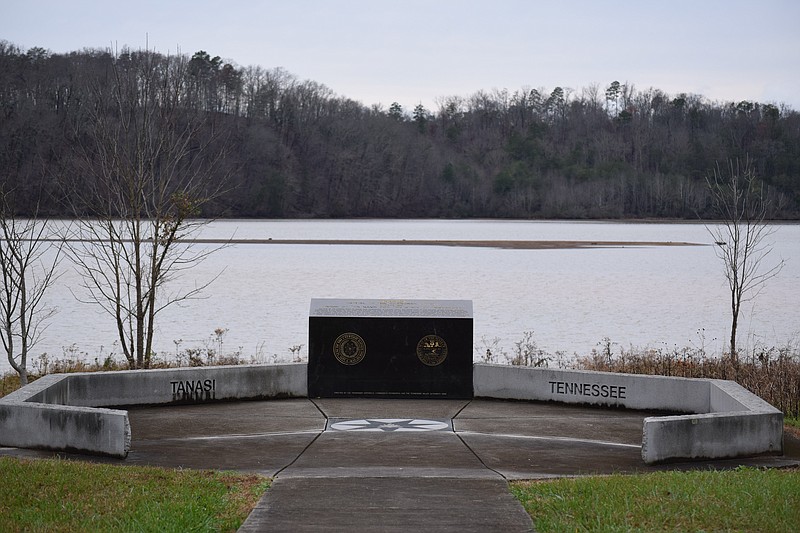For the third time since its original introduction in 2015, a bill seeking to keep a promise to return 76 acres of Cherokee homeland in East Tennessee to its people passed out of the U.S. House and is headed for the U.S. Senate.
"Today, for the third Congress in a row, the House in a wide bipartisan vote passed my bill to return 76 acres of sacred land in Monroe County to the Eastern Band of Cherokee Indians, righting a terrible wrong when their land was forcibly taken from them by the federal government," U.S. Rep. Chuck Fleischmann, R-Ooltewah, said this week in a news release.
The bill passed the House 407-16 with eight members not voting, records show.
The bill stipulates gambling operations cannot be established on the land, and any shoreline work would be subject to TVA approval.
Eastern Band of Cherokee Indians Principal Chief Richard G. Sneed applauded the House's passage Tuesday of the bill and its importance to Cherokee history and one of the tribe's greatest leaders.
"Sequoyah was a statesman, diplomat and seminal leader who contributed so much to help the Cherokee people," Sneed said in the news release. "We look forward to protecting and preserving this monument to his legacy for generations to come."
In Tuesday's vote on the bill, introduced this time as House Resolution 2088, all nine Tennessee House members and all 13 from North Carolina unanimously favored the bill, while 13 of 14 House members in Georgia voted for it, with Rep. Marjorie Taylor Greene voting no, citing taxpayers' pocketbooks.
"Congresswoman Greene voted no because H.R. 2088 forces the American taxpayer to pay the Tennessee Valley Authority for the loss of ability to produce electricity, which hurts North Georgians and Tennesseans," reads a statement emailed Wednesday by Greene's congressional office. "In a time of rapid inflation and skyrocketing energy costs, taxpayers shouldn't be footing the government's bill and paying more each month on their personal electric bill."
As with support for the bill, opposition was bipartisan. Greene was joined by GOP colleagues such as U.S. Rep. Matt Gaetz of Florida. But Democrats such as Maxine Waters of California also voted no.
The legislation now awaits a sponsor in the U.S. Senate. It never gained one following the first two House passages. Justin Doil, a spokesperson for Fleischmann's office, said Wednesday the congressman was "unaware of any Senate companion to our bill."
Fleischmann has referred to the bill as "keeping a promise."
"The Cherokee people have a long, rich history on these lands, and it is the place where Cherokees have honored the birth and life of Sequoyah, one of the most influential and important Native Americans in history," Fleischmann said.
Tribal leaders had approached Fleischmann prior to his filing the original version six years ago, telling him promises to give the land back had been broken.
"I researched this, they were absolutely right and even the promise breakers were very honest with me about the facts, so the facts were never in dispute," Fleischmann said in 2015. "There's no question that the 76 acres in Tanasi were promised to the Cherokee a long time ago and that promise was unfulfilled."
The bill is now on its own in the upper house.
"I hope my colleagues in the Senate recognize the importance of Cherokee tribal land preservation and act quickly to move H.R. 2088 through their chamber and on to President [Joe] Biden's desk," he said.
The land the bill aims to return to the tribe lies in Tennessee, while the Eastern Band of Cherokee Indians who will oversee it live in North Carolina.
"Tennessee's U.S. senators have long deferred to the North Carolina senators - as a courtesy - since the Eastern Band of Cherokee is a federally recognized tribe in North Carolina," said Judd Deere, spokesperson with Tennessee Sen. Bill Hagerty's office. "Sen. Hagerty intends to follow that custom at this time."
Tennessee Sen. Marsha Blackburn and, in North Carolina, Sens. Richard Burr and Thom Tillis, did not respond to emailed inquiries about whether they would introduce the bill in the Senate.
It's been more than 180 years since most of the Cherokee were forced from their homeland by the Indian Removal Act, passed in 1830. More than 15,000 Cherokee were removed from their homes in North Carolina, Georgia, Alabama and Tennessee, leaving ancestral lands behind.
(READ MORE: Damage in 2014 to Trail of Tears in Coker Creek, Tenn., now repaired)
The land involved in the bill includes sites of the Cherokee towns of Tanasi and Chota, two principal towns and de facto capitals of the Overhill Cherokee - those west of the Appalachians - living in East Tennessee, and the birthplace of Sequoyah, the man who invented the Cherokee's written language and established the first national bilingual newspaper. The bill, if passed, would make the 76 acres reservation land and allow the tribe to build facilities for interpretive and educational programs and other uses.
The 129-foot-high Tellico dam was finished in 1979, displacing 276 families with a 15,560-acre reservoir along 33 miles of the Little Tennessee River. TVA acquired 37,900 acres for the project, according to TVA officials.
Work toward the original bill got generous help and knowledge from longtime supporter of the tribe and honorary Cherokee Max Ramsey, who died in 2020 without seeing the bill cross the finish line.
Ramsey, who retired from TVA in 1994, became the first chairperson for the Sequoyah Museum in Vonore, Tennessee, and was a founder of the Trail of Tears Association.
Although the Tellico Dam roused objections from the tribe, TVA remained sensitive to Cherokee concerns, Ramsey told the Times Free Press in 2015. Ramsey worked for TVA in the 1970s when the dam was planned and built and later worked with the Eastern Band of Cherokee in future planning and other affairs.
At that time, archaeologists worked to identify the significant sites and move important historic structures to high ground, according to Ramsey. TVA built Cherokee memorials at the Tanasi-Chota site and helped establish the Sequoyah Birthplace Museum.
(READ MORE: Major upgrades underway at Sequoyah Birthplace Museum in Tennessee)
The three federally recognized tribes of the Cherokee - the Eastern Band of the Cherokee Indians, the Cherokee Nation and the United Keetoowah Band of Cherokee Indians in Oklahoma - all have ties to the Appalachian Mountains and the Little Tennessee River Valley and agreed the group in North Carolina was better situated to care for the memorials and operation of the museum, according to Ramsey.
Operations have remained in Cherokee hands through agreements with TVA that allowed for limited uses by the Cherokee, and since then, changes in the trust process created an opportunity for the Cherokee to gain back the land through legislation.
Ramsey said in 2015 the bill was a way to unify parallel histories of the Cherokee and those who followed to present a larger picture and take a step forward.
Contact Ben Benton at bbenton@timesfreepress.com or 423-757-6569. Follow him on Twitter @BenBenton.

